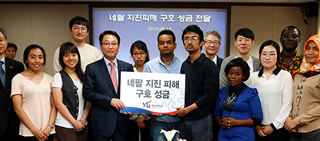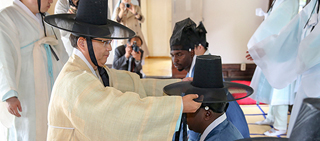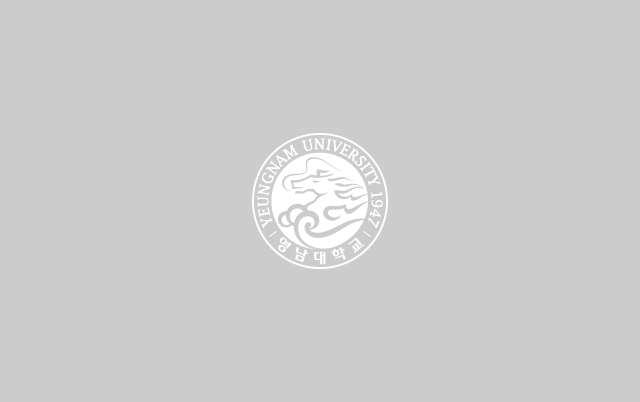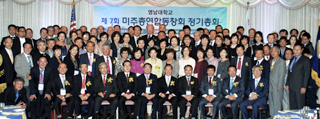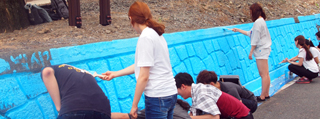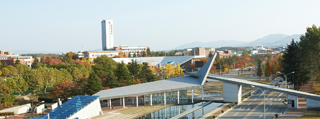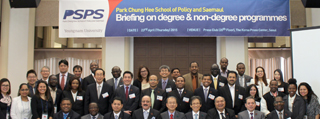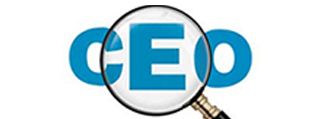-
Faculty and students roll up their sleeves to help victims of the Nepal earthquake Donation drives all around the campus and joined by international students as well Park Chung Hee School of Policy and Saemaul students hold charity bazaar 22 million won in donations handed over to the Ambassador of Nepal [May 19, 2015] “YU is rooting for you, Nepal. Keep your head up!” Charity activities to help victims of the earthquake in Nepal were held all around the YU (President Noh Seok-kyun) campus. Faculty donated parts of their wages to help victims of the Nepal earthquake and gathered 15 million won. Also, the student body (Chairperson Kim Soo-hyun) also held charity drives all around campus from the 8th to the 13th. Choi Min-seok (YU Graduate School of Business Administration, 1st semester), who donated money he saved up to use for his next tuition, said, “After hearing about the earthquake in Nepal, I felt so bad and wanted to help in any way I could. The student body said that they were holding charity drives so I did not hesitate to make the donation.” He added, “I want to ask more people to participate in the donations so that could we help the people of Nepal.” Meanwhile, international students studying at YU also participated to help the people of Nepal. The Park Chung Hee School of Policy and Saemaul also held a charity bazaar on the 6th. These students sold their goods such as clothes and bags to other students and donated all proceeds to victims of the earthquake. <International Students of the Park Chung Hee School of Policy and Saemaul held a bazaar to gather donations for victims of the Nepal earthquake.> International students and professors from Nepal studying at YU also held charity drives on campus to help victims of the earthquake in their country. 36 people including professors and international students from Nepal such as Anup Shrestha (27, 3rd term in master’s degree course in pharmacology), a graduate school student at YU, made donation boxes and stood in front of the YU Central Library in the morning of the 1st. As the vice-chair of the ‘Korea Nepal Student Association’ and the chairperson of the Daegu-Gyeongbuk chapter, Shrestha said, “After hearing news about the earthquake in my home country, I was very sad as a student from Nepal.” She added, “Since it is difficult to help directly as I am studying in Korea, I decided to participate in this charity drive. I hope that the Korean people will show a lot of interest in the earthquake victims of Nepal.” In addition to the international students from Nepal, the YU International Student Support Team faculty also helped with the students’ charity drive. In particular, five of the 31 students from Nepal at YU who participated in the charity drive were from Katmandu, the capital of Nepal. One of the students lost his grandfather to the earthquake, but overcame his sorrows and actively took part in the charity activities. In addition the street charity activities, the Nepalese international students are planning to conduct online donation activities through various SNS such as Facebook and Twitter, while also continuously gathering relief goods and sending them to Nepal to help with restorations and the victims. YU handed over donations of 22 million won gathered by faculty and students to the embassy of Nepal in Korea on the 15th.
-
Coming of Age Ceremony for 43rd ‘Coming of Age Day’ [May 18, 2015] <Traditional coming of age experience ceremony for the 43rd Coming of Age Day> “As crowns were worn three times on a good day of a good year, brothers will love together in virtue and they shall receive the great blessings of the heavens with longevity (以歲之正 以月之令 咸加爾服 兄弟俱在 以成厥德 黃耈無疆 受天之慶)” At the Gugye Seowon of the YU Gyeongsan Campus at 10 a.m. on the 18th, during the ‘Gwannye’(冠禮), the first part of the ‘gwanhonsangje’ ritual, YU President Noh Seok-kyun, who was invited as the guest of honor, recited a message of congratulations to male students who became 20 years old this year. Following the chipo-geon and yu-geon, the students wore the gat, which is the third crown, and tied the strings to officially announce that they had entered adulthood. YU (President Noh Seok-kyun) held the ‘traditional coming of age’ experience ceremony in light of the 43rd ‘coming of age day’. This is a national memorial day designated as the third Monday of May and it is a day to congratulate youths who became 20 years old for reaching physical and mental maturity coming out of puberty and naturally reminding them of their responsibilities and duties as adults. This traditional coming of age ceremony that was even more significant as being the 68th anniversary of the school, a total of eight students including six international students from Tanzania, Jamaica, Malaya, Uzbekistan and China all wore traditional clothes and took part in the ‘gwannye’ for men and ‘gyerye’ for women. Kakono David Mabula (29) from Tanzania who enrolled at the YU Park Chung Hee School of Policy and Saemaul this year said, “Unlike the coming of age ceremony of Tanzania, I was impressed with the really solemn atmosphere and procedures.” He added, “It was a fun experience as a foreign student. I was able to experience the charms of traditional Korean culture that teaches the pride and responsibilities of being an adult.” Gwannye is a ceremony of placing three hats on a man who became the age of 20 that emphasizes his responsibilities to his family, society and country. This ritual is completed by raising the hair in a topknot and wearing three crows. It is divided into the bunni ritual of changing clothes and taking a sip of alcohol to declare to the heavens that one has become an adult called chorye, and the myeongjarye ritual of giving a nickname called ‘ja’ as a representation to keep the body and name given to the new adult from his ancestors. Gyerye is a ritual where a woman undos her pigtails and raises here in a jjok (chignon) and uses a binyeo (hairpin) to officially declare that she is an adult woman. YU President Noh Seok-kyun, who watched the entire traditional coming of age ceremony that lasted for about one and a half hours said, “We must protect and preserve the traditional coming of age ceremony, which is a ritual that is not just a passage ritual, but a ritual of learning and realizing the spirit of filial piety and the pride and responsibility of being an adult.” He added, “I hope that the students who have met their coming of age this year will become the force behind of Korea who respect theirselves, love others, and fulfill their social responsibilities.
-
International Professor for Education Positions at Yeungnam University Gyeongsan, Korea Job Openings Yeungnam University is now accepting applications for International Professor for Education (Assistant Professor/Associate Professor) positions to fill new openings for the Freshmen English program. Located on 900 scenic acres in Gyeongsan, just minutes from Daegu, Yeungnam University is a private post-secondary institution with a student enrollment of over 25,000. 1. Job Titles: International Professor for Education (Assistant Professor/Associate Professor) 2. Period of Contract: September 1st, 2015 - August 31st, 2016 3. Teaching Subjects Practical English & Academic English: Compulsory General Education subjects for freshmen Other credit/non-credit teaching opportunities: English Conversation (6 Levels), Current Issues, Business English, Current Economic Issues, Cultural English, Essay Writing, TOEFL, TOEIC, Teacher Education Programs, English Camps for university students of varying lengths, etc. 4. Teaching Load: International Professor for Education (12 hours per week regardless of rank) ㆍProfessors teach 15-weeks in each of the Spring and Fall Semesters. ㆍProfessors are required to teach in either the summer or winter vacation period if requested, for which overtime rates apply. 5. Education and Experience Requirements International Professor for Education Minimum Requirement: - Assistant Professor: Master’s Degree - four years of university-equivalent teaching experience (including master’s and Ph.D. study period) - Associate Professor: Ph.D. - fourteen years of university-equivalent teaching experience (including master’s and Ph.D. study period) ㆍOne year of university-equivalent experience is calculated as follows: - college and university (contract on National Pension Service): 0.7 years - college and university (contract on Korea Teachers Pension/Government Employees Pension): 1.0 - foreign college and university (non-tenured position): 0.7 years - foreign college and university (tenured position): 1.0 years ㆍGraduate education will be counted in full up to two years for a master’s degree and up to three years for a doctoral degree. ㆍIf the time lines of some of your experiences overlap, only the experience that receives the highest weight will count. ㆍAlthough those applying for professor positions may have a master’s degree in any discipline, preference is given to those who have a 120-hour TESOL certification or their master’s degree in education or TESOL. 6. Salary and Benefits: International Professor for Education (starting level): 3,113,220 won and up per month ㆍOvertime pay: 35,000 won per hour or more ㆍNational Health Insurance: 50/50 Professors: contributions to the Korean Teachers Pension ㆍA university-owned apartment with basic furnishings is provided when available. If there are no vacancies, a housing allowance of 450,000 won per month is provided. Application & Deadline Application Form will be available at: http://www.yu.ac.kr/english Documents Required: 1) YU Application with photo - Please clearly indicate month/year to month/year for each item included in your work experience and education sections. - Cover Letter: Please clearly indicate your knowledge, attributes, skills, and habits that you bring to the position. 2) A copy of your passport identification page (and/or a copy of Korean Alien Registration Card if applicable) 3) Two letters of recommendation (Please include the contact details of three references on your resume.) ** Please note: 1) Additional documents such as diplomas, transcripts, etc. are not needed at this stage. 2) Application will not be considered complete until documents listed above are all received. And only those who pass initial screening will be contacted. Deadline: Sunday, June 14th, 2015 - E-mail: jobinterview@ynu.ac.kr (Email application required.) - Direct your email to: Dr. Sun Joo Park Director, Foreign Language Institute, Yeungnam University 280 Daehak-Ro, Gyeongsan-si, Gyeongsangbuk-do, Republic of Korea 712-749 Phone: +82-53-810-1632 Fax: +82-53-810-4729 We look forward to receiving your application to join the faculty at Yeungnam University.
-
7th general meeting of the US Alumni Association held in LA from 9th to 11th Donation of 10,000 dollars for development fund of YU and alumni association, and 6,000 dollar scholarship for junior students studying in the US Luncheon held with over 30 students participating in overseas intern program 8th general meeting scheduled to be held in 2017 in Atlanta [2015-5-13] The alumni power of YU (President Noh Seok-kyun) shined bright in the United States as well. The YU US Alumni Association (Chairman Kim Byeong-tak, Economics class of ‘66) held its 7th general meeting at the Oxford Palace Hotel in Los Angeles, California from May 9 to 11. In addition to the 130 alumni throughout the United States, 30 YU students working as interns in LA also attended this meeting. At the general meeting, YU President Noh Seok-kyun and National Assemblyman Lee Wan-young, who was from the Department of Public Administration class of ‘76 also attended. At this meeting, the US Alumni Association donated 10,000 dollars for the school and alumni association development fund, while also giving a total of 6,000 dollars in scholarships to three juniors currently studying in the United States. At the scholarship ceremony held on the 9th, Lee Seung-yeob (36) who graduated from YU majoring in Architectural Engineering in February 2003 and is currently working on his PhD (major in architecture, landscaping and culture) at the University of Wisconsin-Milwaukee), Jang Hye-in (3) who graduated from the YU Department of Biotechnology in February 2008 and is currently working on her PhD (major in molecular and cellular biochemistry) at the University of Kentucky, and Kim Ye-reum (27) who graduated from the YU School of Music in February 2011 and is currently enrolled in a master’s degree program (major in piano) at the Cleveland Institute of Music received 2,000 dollars in scholarships each. <Former chairmen of the YU US Alumni Association and YU President Noh Seok-kyun> At the general meeting, Lee Il-geon (64), who graduated from the Department of Chemical Engineering in the class of ‘69 and served as the head of the steering committee for this meeting, was appointed as the 7th chairman of the association. Mr. Lee said, “The US Alumni Association will continuously increase overseas internship programs and scholarships so that our juniors at YU can gain rich experiences in a broader world,” and added, “I hope that YU alumni will be active not only in the United States but throughout the world.” Meanwhile, during the general meeting period, President Noh Seok-kyun invited 30 YU students participating in internship programs in LA and held a luncheon at a Korean restaurant in downtown LA. Mr. Noh and the students were able to freely talk about the overseas internship program and their life abroad. <President Noh Seok-kyun held a luncheon with YU students currently participating in internship programs in the United States.> YU President Noh Seok-kyun said, “By broadening your horizons through the overseas internship program and overcoming your limitations one at a time, you will have the ability to overcome difficulties even after graduating and going into the real world,” and added, “I hope that you will do your best until the end of your internship and make this an opportunity to upgrade your capacities.” Jeon Min-gyeong (21, senior in international commerce) who is doing her internship at Forever 21, an American fashion company, said, “In addition to practical knowledge for the office, I was also able to improve my foreign language skills so I am happy that I participated in this internship program.” She added, “There are some difficulties living here in the United States as a student, but the surprise visit by the president of YU and his words of encouragement really helped me.” The YU US Alumni Association held their founding meeting in LA in October 2002, and there are a total of 10 regional alumni associations in the United States including in Chicago, New York and Washington. The 8th general meeting in 2017 will be held in Atlanta, and former University of Georgia Professor Jeon Heung-won (75) from the YU Department of Pharmacy class of ‘58 is scheduled to take charge as the head of the steering committee.
-
'YU Volunteer Day' proclaimed on 68th anniversary of school, vow to practice every year First year, facelift for the Gyeongsan Heungsan 1-2 ri Sister Village YU president, students and faculty for a total of over 700 takes part in talent sharing Practicing leadership of ‘coexistence’, ‘serving’ and ‘consideration’ [2015-5-15] “This quiet rural town has become much brighter with so many college students visiting. I hope that our town will develop through our ties with YU.” Kim Young-jin (67), the village foreman of Heungsan 1-ri, greeted the 500 YU students who visited the town with thanks. A total of 700 people including YU President Noh Seok-kyun, 500 YU students, faculty, public officials of Gyeongsan, and community volunteers for a total of over 700 people came to this town to provide volunteer services on the ‘YU Volunteer Day’ on May 15. YU (President Noh Seok-kyun) proclaimed the ‘YU Volunteer Day’ in light of the 68th anniversary of the school to carry out large-scale volunteer work. YU designated May 15 as the ‘Volunteer Day’ and is planning to carry out regular joint volunteer work every year together with the city of Gyeongsan. As part of this, this year they carried out the ‘YU-Ilchon Village Facelift’. On the 15th, YU made ‘sisterhood’ ties with Heungsan 1 and 2-ri of Namcheon-myeon, Gyeongsan to carry out town decorating and talent-sharing activities. The 700 plus volunteers who gathered on this day engaged in massive volunteer activities fom 10 a.m. to 5:30 p.m. 20 students from ‘Yeongjihoe’, YU’s home repair volunteer club, helped make pleasant residential environments by redoing the walls and floors for five homes in Heungsan-ri, while the photo club ‘Sawoohoe’ offered ‘long-life photo-taking’, and art majors helped paint the town walls. Thus, YU students all took the initiative to volunteer using their majors and talents. Kwon So-yeon (19, freshmen Humanities and Sociology major), who took part in the wall and flooring volunteer activity, said, “I have always been interested in volunteer activities, so I joined a volunteer school as soon as I was admitted to the university and have been participating continuously in volunteer work,” and added, “It was much more fun and fulfilling by participating in volunteer work with other students from my school. I hope that with the ‘YU Volunteer Day’ more students will be able to experience the joy of volunteering.” In particular, students of the YU Department of Cultural Anthropology are planning to visit local elders and government offices to produce and distribute a ‘town journal’ containing the origin, history and culture of Heungsan-ri. In addition, the YU Medical School also participated offering free health examinations for town residents and received good responses from residents. On one side of the town, the ‘Jangsan Pungmuldan’ under the Gyeongsan Jungban Farm Music Preservation Association performed in a traditional pungmul concert to entertain the local elders. Meanwhile, a ‘food truck’ was operated at the Gyeongsan Senior Welfare Center and the Daegu Lunch Volunteer Association and volunteers served noodles to the local residents. Thus, in addition to YU students and faculty, volunteers from the Daegu and Gyeongbuk area, as well as community members participated in the volunteer activities of the YU Volunteer Day. It is very rare for a university to designate a Volunteer Day and engage in massive talent-sharing volunteer activities together with the local government, welfare organizations and residents. YU President Noh Seok-kyun stated, “We designated the Volunteer Day to complete the university’s social responsibilities for mutual growth and development together with the local society and to foster human resources who practice leadership of serving and consideration,” while adding, “We hope that the ‘YU Volunteer Day’ will be established as a volunteer event that represents the local society in the future. Meanwhile, at 3 p.m., YU will hold a declaration ceremony for the Volunteer Day at Heungsan 1-ri at 3 p.m. and also hold a ceremony for raising a sister village sign board. Starting with this event, YU will designated every third week of May as the ‘Volunteer Week’ from next year to expand opportunities to share and practice volunteering.
-
Pursuing commercialization of excellent technologies of university with the support of the Ministry of Education and National Research Foundation Yeungnam University and Kyungpook National University industry-academic cooperation consortium selected as first place in the Daegu-Gyeongbuk-Gangwon area 2.3 billion won in funding for three years focusing on commercialization of renewable energy and pharmaceutical and bio sectors YU (President Noh Seok-kyun) will pursue the commercialization of outstanding technologies that the university possesses with the support of the government. On the 13th, YU was selected for the ‘University Creative Asset Commercialization Support Project’ hosted by the Ministry of Education and National Research Foundation and will receive a 770 million won per year for a total of 2.3 billion won for three years. In this project, YU was selected as first place in the Daegu-Gyeongbuk region for the industry-academic cooperation team innovative project sector by organizing a consortium with Kyungpook National University. This project was designed to resolve difficulties in technological commercialization for universities that create excellent research infrastructure and research achievements, but not having enough development expenses after transferring technologies. A total of 30 project groups (59 universities) applied for the industry-academic cooperation team innovation-type and research center innovation type sectors, and the final decision was made after the first stage written evaluation (quantitative and qualitative) and second stage presentation evaluation (qualitative) for one month starting in April. Including the YU-Kyungpook National University consortium, a total of 18 project teams such as △ Kangwon University (Inha University, Hallym University, Gangeung-Wonju National University), △ Konkuk University (Catholic University of Korea) △ Korea University △ Gyeongsang National University (Changwon National University, Inje University, Sunchon National University) △ Kyunghee University △ Pusan National University (University of Ulsan, Pukyong National University, Korea Maritime and Ocean University, Dong-eui University) △ Seogang University △ Seoul National University △ Sungkyunkwan University △ Aju University (Seoul National University of Science and Technology, Dankook University Jukjeon Campus, Kookmin University) △ Yonsei University △ Chonnam National University (Chonbuk National University, Jeju National University, Wonkwang University) △ Chung-Ang University (Ewha Womens University, Dongguk University) △ Pohang University of Science and Technology △ Chungnam National University (Konyang University, Soonchunhyang University, Hannam University, Hankyong National University) △ Chungbuk National University (Korea National University of Transportation, Hanbat University, Sun Moon University, Korea University of Technology and Education) and △Hanyang University Seoul Campus (Hanyang University ERICA, Sejong University). Seoul National University and Chonbuk National University were selected for the research center innovation-type project. By being selected for this project, YU is planning to pursue commercialization focusing on the renewable energy, pharmaceutical bio, treatment instrument and diagnostic instrument sectors. With this, YU has become able to collect and analyze domestic and international industrial and research and development trends, follow-up R&D on commercialization, and overseas patent designs with the support of the government. It is also expected by being manned with personnel exclusively working on commercialization such as patent attorneys and industry trend experts, it will be possible to carry on with follow-up research and production of prototypes that converges the different fields.
-
YU President Noh Seok-kyun signs exchange agreement with the number 1 and 2 ranked universities of Mexico Global partnership expanding from Europe in February now to Central and South America [2015-5-7] YU (President Noh Seok-kyun) visited the top national and private universities of Mexico and agreed to expand their global partnership by exchanging students and professors. <Mr. Noh’s group visited the National Autonomous University of Mexico and agreed to begin full-fledged exchanges> YU President Noh Seok-kyun and his envoy visited the National Autonomous University of Mexico (hereinafter ‘UNAM’) and the Tecnologico de Monterrey Campus Queretaro (hereinafter ‘ITESM’) on the 4th and 5th and agreed on not only academic exchange such as professor and student exchange programs, but also for the operation of cultural exchange programs between the two nations. UNAM is Mexico’s number 1 university located in Mexico City, the capital of Mexico. It is Latin America’s top research-oriented university that graduated three Nobel Prize winners and students in the top 10% tier of Mexico study here. It signed an MOU for student and academic exchange in August 2013 and with this visit by Mr. Noh, actual exchange is expected to take place. UNAM International Affairs Director Armando Lodigiani Rodriguez and Academic Cooperation Office Director Angelica Castillo Salazar proposed to Mr. Noh during his visit on the 4th to begin exchange professor programs exchange three students in the social science sector. Accordingly, YU will begin offering Spanish classes from 2016 for YU students going to UNAM, while UNAM will provide 4,000 pesos (approximately 280,000 won) to YU students studying at their school. This is expected to promote the personnel exchange between the two universities. <Mobile classroom of ITESM> On the day after visiting UNAM, Mr. Noh visited ITESM on the 5th and promised to look into student and professor exchange programs, summer school, and internship programs. ITESM, which is located in Querataro, Mexico, is Mexico’s number 2 university and is a massive private university with 31 campuses and over 60,000 students. It signed an academic exchange agreement with YU in 2012 and five YU students come here as exchange students every year. With this agreement, ITESM will send students to the YU Summer School from 2016 and offer opportunities to experience Korean language and culture. It is expected that through this, YU will act as a forward base for spreading the Korean cultural wave in Central and South America. ITESM International Affairs Director Carla Diez said, “30% of all classes at ITESM are in English and most classes are composed of the latest practical teaching methods,” while adding, “I hope that many students from YU will acquire academic knowledge and become global human resources by learning the culture of Mexico.” In response, YU President Noh Seok-kyun said, “Spanish is the second most spoken foreign language in the world and so I hope that YU students will take this opportunity to step foot in the Central and South American market, which is a new emerging market, through the exchange student program.” Meanwhile, YU President visited prestigious universities and major research institutes of Europe such as Oxford in England, Strasbourg University in France, and Fraunhofer-Gesellschaft in Germany in February and signed agreements for student exchange and joint research. It is continuously expanding its global partnership to Europe and Central and South America instead of focusing solely on the United States. <ITESM President (left) and YU President Noh Seok-kyun exchange souvenirs>
-
Park Chung Hee School of Policy and Saemaul holds invitational seminar of diplomats to Korea High interest with participation of diplomats including 24 ambassadors to Korea YU "We will lead the co-prosperity of the global community by fostering global Saemaul leaders" [2015-4-27] <The Park Chung Hee School of Policy and Saemaul held an invitational seminar with diplomats in Korea for the fostering of global Saemaul leaders.> (23rd, Seoul Korea Press Center) YU is concentrating on attracting outstanding talents of emerging countries to foster them into global Saemaul leaders. On the 23rd, the Park Chung Hee School of Policy and Saemaul (Dean Park Seung-woo) invited foreign diplomats in Korea to the Seoul Korea Press Center and held a seminar. A total of 25 diplomatic envoys in Korea from 24 countries including the ambassadors of Nicaragua, Sierra Leone, Angola, Cambodia, Tunisia, Papa New Guinea, and Fiji attended showing a great deal of interest in fostering Saemaul leaders for their countries. YU Vice President Choi Wae-chul (International Development Cooperation Center Director) who oversees YU's international development and cooperation projects also attended this seminar. Mr. Choi gave a welcoming address saying, "YU will share Korea's development experience and knowhow in the Saemaul Undong to help resolve the global poverty issue," and added, "We will do our best in fostering talents for the development of Saemaul for the regional development of emerging countries." At this seminar, information was provided on the founding purpose, offered departments, faculty, educational facilities and dormitories, scholarship programs, and graduate student activities of the Park Chung Hee School of Policy and Saemaul. As if to reflect the high interest of emerging countries on the Saemaul Undong, questions and answers were exchanged throughout the entire seminar. In particular, 11 international students at the Park Chung Hee School of Policy and Saemaul attended the seminar as well to share the advantages of the Park Chung Hee School of Policy and Saemaul that they felt as students of the science of Saemaul, and received a great deal of interest and applause from ambassadors and personnel from emerging countries. Through one-on-one meetings with students from their home countries, diplomats in attendance had the opportunity to listen to the Park Chung Hee School of Policy and Saemaul's outstanding faculty, quality of student support, and advantages in forming global networks through the mouths of students. Dean Park Seung-woo said, "We held this seminar to request cooperation to attract talented minds to our school, while also to solidify a continuous and friendly partnership with emerging countries," and added, "The Park Chung Hee School of Policy and Saemaul will continue to fulfill its role as a specialized educational institute in fostering experts for economical and social development based on the Saemaul Undong in order to contribute in the overcoming of poverty in the international community and for the joint prosperity of the global community." The Park Chung Hee School of Policy and Saemaul was founded in 2011 to share the successful social and economical development and Saemaul Undong experiences of Korea and to foster global Saemaul leaders for emerging countries. As of now, 258 international students from 52 countries came to YU to learn the 'Saemaul Science', and as of the first semester of 2015, over 160 international students from 42 countries are learning 'Saemaul Science' and about Korea's development experiences. Furthermore, in response to the continuous requests for education on Saemaul Undong from underdeveloped countries, YU also established the International Development Cooperation Center in 2013. As of now, 1,669 public officials and leaders from 39 countries received training on the Saemaul Undong, urban and regional development theories, and practices, and have returned to their home countries to utilize them in developing policies.
-
Only university not in the Seoul area to be in the top 6 Three CEOs including Kang Hak-seo (Business Administration '79), president of Hyundai Steel [2015-4-23] YU (President Noh Seok-kyun) was listed in the nation's top six for universities with alumni as CEOs of the nation's top 100 companies that lead the Korean economy. Recently, the monthly economic periodical, Modern Management, made this announcement after analyzing the educational backgrounds of the CEOs of Korea's top 100 companies. In result, it was found that for the 134 CEOs in the 100 top companies, YU placed sixth in the nation, and first in universities outside of the Seoul area. In addition to YU, which was the only university to be placed in the top six among universities not in the Seoul area, 48 were from Seoul National University, 21 from Korea University, 14 from Yonsei University, 11 from Hanyang University, 4 from Hankuk University of Foreign Studies, 3 from Seogang University, and two each from Pusan National University, Sungkyunkwan University, Inha University, and Choong Ang University, to complete the list of the top 10. YU graduated a total of three CEOs in the nation's top 100 companies, including Kang Hak-seo (6), who is the president of Hyundai Steel. Hyundai Steel CEO Kang Hak-seo was from the YU Department of Business Administration class of 79 and served as the vice-president and CEO of Hyundai-Rotem, and the vice president of Hyundai Steel, and then became appointed as the CEO of Hyundai Steel in October of last year. Meanwhile, YU was also placed in the nation's top 10 for university rankings for graduating executives for the top 10 companies in term of market value by the Chosun Daily last year. In the KOSAQ Association's survey on 'Manager Status of Corporations listed in KOSDAQ', YU placed sixth in the nation for two consecutive years in 2013 and 2014 and first outside of the Seoul area, demonstrating the power of the alumni who are leading the financial circles of Korea.
-
US Wharton School-UK QS joint education innovation award gives 3rd place in world for e-learning Ranks up to 3rd place in 8 sectors, YU only Korean university to be listed First in Korea to begin mobile learning in 2011, and over 160,000 students earned credits from 95 universities Providing innovative e-learning with two-way communication, realized goal of lifelong education [2015-4-26] YU (President Noh Seok-kyun) was recognized for its excellence in 'e-learning' from the world's most prestigious MBA, the Wharton School of the University of Pennsylvania. YU was ranked third in the e-learning sector by the ‘The Wharton-QS Stars Reimagine Education Awards 2014’ co-hosted by the Wharton School of the United States and QS, a global university evaluation institute based in England. This evaluation and awarding event was conducted for the first time for universities around the world to resolve issues with increased expenses for traditional teaching methods, while also substituting new educational demands. Judges included professors from major universities around the world including Columbia University of the US, University of London of England, University of Waterloo of Canada, University of Coimbra of Portugal, IE University of Spain, University of New South Wales of Australia, National University of Singapore, and the University of Hong Kong, as well as experts from global companies such as Google, Inc., Amazon Web Services, and The Palmer Group. In result, universities selected as excellent education innovation cases in a total of eight sectors including e-learning and hybrid learning were ranked up to the top three and announced in its official homepage (http://www.reimagine-education.com). YU was the only Korean university to be selected and it received international recognition for the excellence of its education innovation. According to this, YU was selected as the third in the world in the e-learning sector. Tied for first place were National Taiwan University and University of Colorado, Boulder, while second place went to Purdue University of the United States. In the hybrid learning sector that combines online and offline education, first place went to the University of Utah in the US, while Delft University of Technology in the Netherlands and the Hong Kong University of Science and Technology tied for second, while Harvard Medical School was placed third. In the presence learning sector, McMaster University of Canada, Tsinghua University of China, and East Carolina University of the US took first, second and third places, respectively, showing that these world acclaimed universities are leading education innovation. YU was the first in Korea to begin mobile learning services using smart phones in Korea. In the past three years, a total of 958 classes were offered, and 160,355 students in a total of 95 colleges were analyzed to have taken classes according to the credit swap program. Furthermore, 78% of all YU students were found to be currently taking mobile-based e-learning or blended learning. In particular, YU currently offers 120 open courses in KOCW (Korea Open Courseware) and is contributing in realizing the goal of lifelong education. Considering that on average, the 152 universities of Korea that offer KOWC offer 33 classes each, it is a very high number. Also, YU introduced the mobile-based LMS (Learning Management System) and offers educational services through the smart phone to both enrolled students and graduates. In particular, the implementation of LMS made possible two-way communication between the professor and student, and it was thus judged to have solved the problem with lack of communication for online classes. As such achievements of YU became known, universities around the world started showing interest. For example, Taylor's University of Malaysia offered airfare and lodging to invite YU personnel in order to hold a seminar on future education on the 8th of next month. On this, YU President Noh Seok-kyun said, "The development of technology is bringing about innovation in the educational field as well," and added, "As an age of studying, debating and reviewing anywhere, anytime has opened before us, true lifelong education will become possible."
